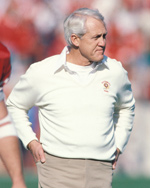The Super Bowl heads north
The first 15 Super Bowls were played in warm weather states like Florida, California and Louisiana. So, it was a bit of surprise when the location for Super Bowl XVI was announced. The site for the game scheduled for Jan. 24, 1982 was the Pontiac Silverdome in Detroit. It marked the first Super Bowl played in a northern stadium.
Super Bowl XVI featured the Cincinnati Bengals representing the American Football Conference taking on the National Football Conference champion San Francisco 49ers. The 49ers were coached by Bill Walsh, who just seven seasons earlier had been the Bengals offensive assistant under founder, owner and head coach Paul Brown. When Brown, a National Football League innovator, retired as head coach of the Bengals after the ’75 season, many thought that he would tap his young budding offensive genius to run the team. Instead, Brown chose Bill Johnson his long-time offensive line coach, who had been with the team since its first season in 1968.
The game started out in Cincinnati’s favor as running back Amos Lawrence fumbled the kickoff, which gave the Bengals the ball at the 49ers’ 26-yard line. The Bengals failed to capitalize on the chance when quarterback Ken Anderson was intercepted by free safety Dwight Hicks. San Francisco’s Joe Montana then led an eleven-play, 68-yard drive that he capped off as he dove into the end zone for a one-yard touchdown run.
 After an exchange of punts, the Bengals found themselves back deep in San Francisco territory. On second and nine from the San Francisco 27-yard line, Anderson hit wide receiver Cris Collinsworth for 19-yards but the ball was stripped loose and the 49ers recovered it on the eight. Once again, Montana moved the Niners’ offense down the field on a 12-play, 92-yard drive. It was capped off by an 11-yard touchdown pass to fullback Earl Cooper to put San Francisco up 14-0.
After an exchange of punts, the Bengals found themselves back deep in San Francisco territory. On second and nine from the San Francisco 27-yard line, Anderson hit wide receiver Cris Collinsworth for 19-yards but the ball was stripped loose and the 49ers recovered it on the eight. Once again, Montana moved the Niners’ offense down the field on a 12-play, 92-yard drive. It was capped off by an 11-yard touchdown pass to fullback Earl Cooper to put San Francisco up 14-0.
After a Bengals punt, the 49ers’ offense took the field with just over four minutes remaining before halftime. Montana methodically moved the offense into field goal range, and with 18-seconds left Ray Wersching kicked a 22-yard field goal. On the ensuing kickoff Bengals running back Archie Griffin fumbled the ball and it was recovered by San Francisco at the four-yard line. Wersching connected on a 26-yard field goal as the half end to give his team what was then a Super Bowl record 20-0 lead after two quarters of play.
Cincinnati rebounded in the second half as they closed the gap to 20-14 on an Anderson 5-yard touchdown run and a 5-yard pass play from Anderson to tight end Dan Ross. Anderson established Super Bowl passing records for completions (25) and completion percentage (73.5 percent on 25 of 34). Ross set the mark for most catches in a Super Bowl (11), a record that has been tied but not yet eclipsed.
Wersching added two fourth-quarter field goals from 40 and 23 yards to increase the 49ers' lead to 26-14, and also tied a Super Bowl record with four field goals.
The Bengals managed to score one more touchdown on an Anderson-to-Ross 3-yard pass with only 16 seconds left that cut the lead to 26-20. But the attempted onside kick that followed was recovered by San Francisco who earned their first of three Vince Lombardi Trophies in the 1980s.
Montana was named the game's most valuable player as he completed 14 of 22 passes for 157 yards.
Cincinnati compiled 356 yards to San Francisco's 275, which marked the first time in Super Bowl history that the team that gained the most yards from scrimmage lost the game. And in the end Coach Walsh left the Pontiac Silverdome victorious against his mentor.
Fire those cannons!
FOR PETE'S SAKE congrats Hall of Famer Lee Roy Selmon and the Buccaneers for unveiling its new Ring of Honor.
Ward jersey to Canton
Steelers WR Hines Ward is the latest player to have a memento from the 2009 NFL season sent to the Hall of Fame.

